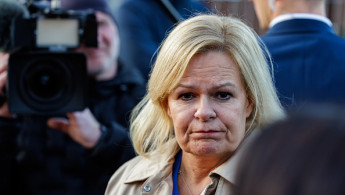GCC rejects German minister's 'interference' in Qatar affairs ahead of World Cup
The Gulf Cooperation Council on Saturday denounced statements made by Germany’s interior minister against Qatar hosting the 2022 FIFA World Cup.
GCC Secretary-General Nayef Falah Mubarak Al Hajraf affirmed the council’s support for Qatar against foreign interference in its internal affairs, denouncing what he said were "allegations that do not serve the establishment of normal relations between two countries," referring to Qatar and Germany.
He said the German statments constituted "a violation of diplomatic norms and traditions and international laws."
Al-Hajraf hailed Qatar’s hosting of the FIFA World Cup this year a "a source of pride and honour," speaking of the "pioneering role of Qatar in building civilised communication and promoting understanding between peoples in a framework of mutual respect."
Qatar's foreign ministry on Friday summoned the German ambassador to Doha and handed him a protest memorandum over Interior Minister Nancy Faeser's comments.
Hamad bin Abdulaziz Al-Kawari: #Qatar 2022 could return a sense of confidence to the Arab world@alkawari4unesco#FIFAWorldCup https://t.co/jJAemgS1Me
— صدام الكمالي Saddam Alkamali (@saddam_alkamali) October 20, 2022
Faeser had criticised Qatar's human rights record during an interview with local broadcaster ARD, saying that the German government is convinced that the awarding of major sports events should be tied to observance of human rights and sustainability.
"There are criteria that have to be kept to, and then it would be better not to award to such states," Faeser said.
She plans to visit Qatar on Monday and Tuesday with the government’s human rights commissioner, German lawmakers and a delegation from the German soccer federation.
The global football tournament is set to kick off on November 18.
Qatar has faced Western criticism over the issue of workers' rights and restrictions on same-sex relations.
However, Doha has hit back at what it says are unfair attacks and failure to recognise the reforms it has made, saying everyone, including members of the LGBT community, is welcome at the World Cup.
This is the first time a foreign ambassador has been summoned over such comments.





 Follow the Middle East's top stories in English at The New Arab on Google News
Follow the Middle East's top stories in English at The New Arab on Google News
![Netanyahu furiously denounced the ICC [Getty]](/sites/default/files/styles/image_330x185/public/2024-11/GettyImages-2169352575.jpg?h=199d8c1f&itok=-vRiruf5)
![Both Hamas and the Palestinian Authority welcomed the ICC arrest warrants [Getty]](/sites/default/files/styles/image_330x185/public/2024-11/GettyImages-2178351173.jpg?h=199d8c1f&itok=TV858iVg)
